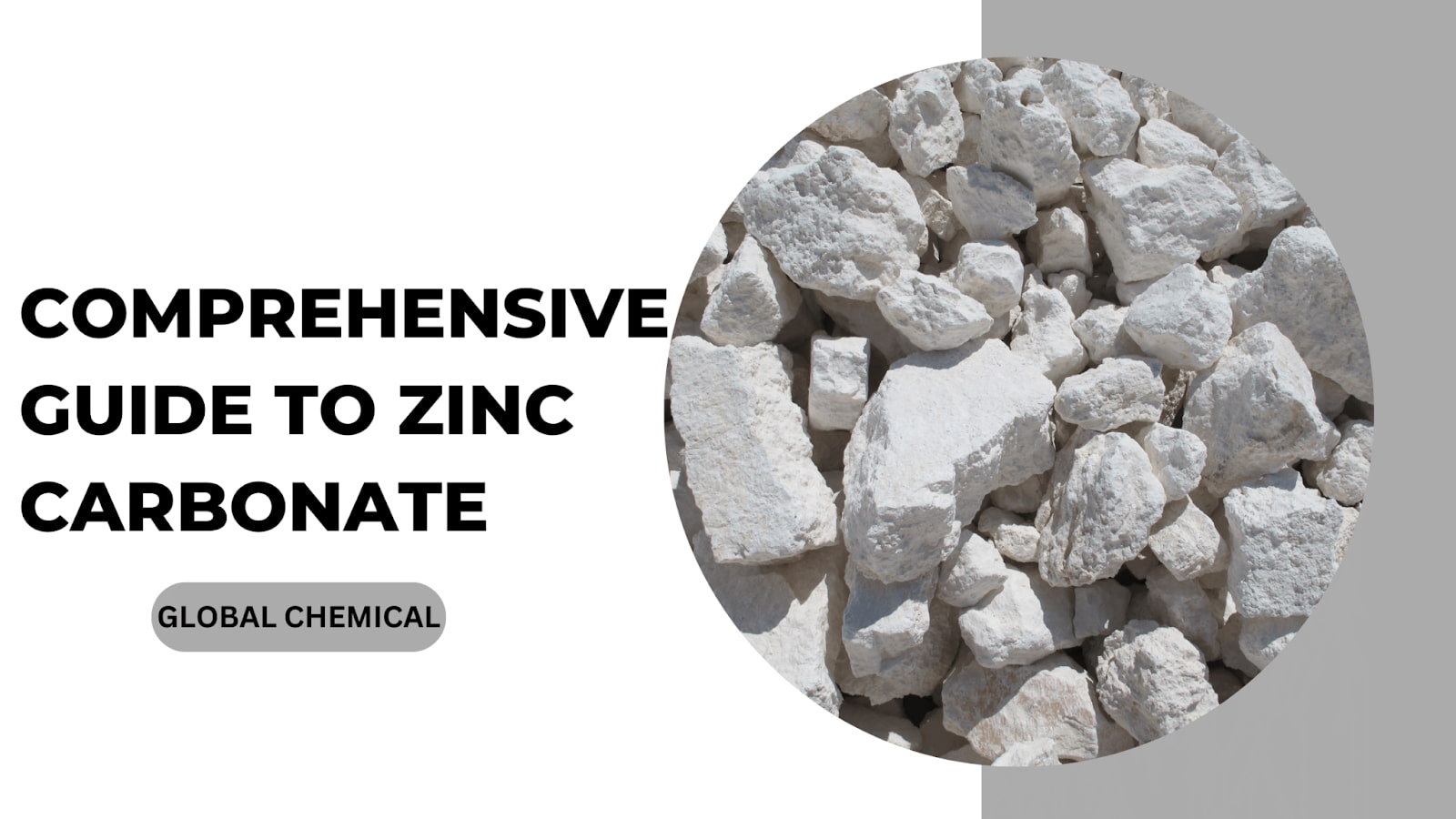
Zinc carbonate is a versatile compound with wide-ranging applications across various industries, thanks to its unique properties. This guide delves into its chemical properties, production methods, diverse applications, and benefits.
Chemical Properties and Structure
Zinc carbonate (ZnCO₃) appears as a white crystalline powder. It is insoluble in water but dissolves in acids, has a trigonal crystal structure, and a molecular weight of 125.39 g/mol. While stable under standard conditions, it decomposes when heated, releasing carbon dioxide.
Physical Properties
- Appearance: White crystalline powder
- Solubility: Insoluble in water, soluble in acids
- Stability: Stable under standard conditions, decomposes when heated
Production Methods
Several methods are used to produce ZnCO₃, each with unique advantages:
- Precipitation: Involves reacting zinc sulfate with sodium carbonate, forming ZnCO₃ and sodium sulfate.
- Carbonation: Carbon dioxide is passed through a solution of zinc salts, resulting in the precipitation of ZnCO₃.
- Hydrothermal Synthesis: Uses high temperature and pressure to produce high-purity crystals.
Innovations in production have led to more efficient and environmentally friendly processes, reducing waste and energy consumption.
Applications
Pharmaceuticals
Zinc carbonate is used as an astringent and antiseptic in lotions and ointments for skin conditions like eczema and psoriasis. Its anti-inflammatory properties help soothe irritation and promote healing. It’s also a key ingredient in calamine lotion, effective against itching and minor skin irritations.
Paints and Coatings
Valued for its anti-corrosive properties, zinc carbonate acts as a protective layer preventing rust and degradation of metal surfaces. It also enhances the adhesion and durability of paints, making them more resistant to weathering, which extends the lifespan of infrastructure and reduces maintenance costs.
For more details on these and other applications, check out our blog post on Exploring the Diverse Applications of Zinc Carbonate: From Pharmaceuticals to Paints.
Industrial Uses
Applications in the Rubber Industry
In the rubber industry, zinc carbonate acts as an activator in the vulcanization process, improving the elasticity and durability of rubber products. It also serves as a filler, enhancing the mechanical properties of rubber, making it essential in the production of high-quality rubber goods like tires, seals, and gaskets.
Use in Ceramics, Glass, and Other Industrial Sectors
In ceramics and glass manufacturing, zinc carbonate improves thermal stability and transparency. It is also used in producing inks, textiles, and lubricants, showcasing its versatility across different industrial sectors. For example, in glass production, it helps control the melting temperature and improves the optical clarity of the final product.
Agricultural Benefits
Zinc carbonate plays a significant role in agriculture, primarily in fertilizers. It provides essential zinc nutrients to plants, promoting growth and improving crop yields. Case studies have shown that zinc carbonate-based fertilizers enhance soil health and increase the nutritional value of crops. Farmers have reported higher yields and improved resistance to diseases in crops treated with these fertilizers.
Personal Care Applications
This compound is widely used in cosmetics and personal care products. It serves as a key ingredient in sunscreens, providing UV protection. Its antimicrobial properties make it effective in deodorants and anti-dandruff shampoos, while its soothing effects benefit skincare products designed for sensitive or irritated skin. Additionally, it is used in formulations for baby powders and creams, offering gentle care for delicate skin.
Environmental and Safety Considerations
While generally safe to handle, proper safety guidelines should be followed to prevent inhalation or skin contact. It should be stored in a dry, cool place away from incompatible substances. Regulatory bodies set standards to ensure its safe use and minimize environmental impact. Proper disposal methods should be followed to avoid contaminating water sources and soil.
Comparative Analysis with Other Zinc Compounds
Zinc carbonate offers unique advantages over other zinc compounds like zinc oxide and zinc sulfate. For instance, it provides better stability in various formulations and specific benefits in pharmaceuticals and cosmetics. Each zinc compound has its own set of use cases, making them suitable for different industrial needs. For example, zinc oxide is commonly used for its UV-blocking properties in sunscreens, while zinc sulfate is often used as a dietary supplement for zinc deficiency.
Frequently Asked Questions
What are the main uses of zinc carbonate?
It is used in pharmaceuticals, paints and coatings, rubber production, ceramics, glass, agriculture, and personal care products.
How is zinc carbonate produced?
It can be produced through precipitation, carbonation, and hydrothermal synthesis.
Is zinc carbonate safe to use?
Yes, when handled according to safety guidelines, it is safe for use in various applications.
Can zinc carbonate be used in food products?
While it is not typically used in food products, other zinc compounds like zinc sulfate are commonly used as dietary supplements.
Conclusion
Zinc carbonate is an invaluable compound with diverse applications across multiple industries. Its unique properties and benefits make it a crucial ingredient in products ranging from pharmaceuticals to paints, and from agriculture to personal care. Understanding its properties and uses highlights the importance of zinc carbonate in modern industry and daily life. As advancements in production and application continue, its significance is expected to grow, contributing to innovation and sustainability across various sectors.
